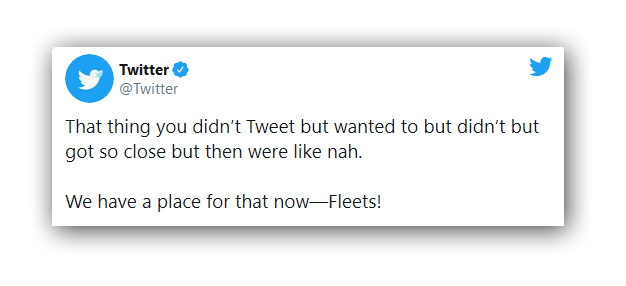I generally ignore twitter. But sometimes, something happens there that just screams, “ignore me some more!”
In a bid to remain relevant in the “quip dissemination backbone” market, Twitter is offering a new service that allows you to post something that automatically disappears after a while. Needless to say there will be services that scrape and cache the disappearing entries, so the whole thing will be quite pointless and we can collectively go back to wondering why anyone gives a shit about any of it. Twitter has decided to set up an ignorability gradient, or something much like one.
Except they named it after another popular product: [twit] Do go on, you clever little twitterers:
Do go on, you clever little twitterers:

There is potential for an amusing marketing cultural collision. Clean up in aisle 5!

Back in my day, before we released a product, we did a trademark search, patent search, etc. Just to make sure all of our bases were covered and we didn’t do something like release a new toilet called “Verizon” or anything like that. I guess what we’re seeing here is tech’s great google-swollen ego, “we don’t need to ask, we’ll do what we want and apologize later.” I hope John Oliver provides some pro bono consulting on this topic; the Fleet(r) trademark is under assault.

IANAL but…
Legally, I don’t think that would be a problem. Trademarks apply within a given market. So for example, Apple Computer was able to sell computers even though a company called Apple Music already existed. And of course, produce markets are allowed to sell apples in the produce aisles, but not in the computer aisle unless they come from Apple Computer.
Reginald Selkirk (#1) –
I see what you did there.
Re: #1
“”And of course, produce markets are allowed to sell apples in the produce aisles, but not in the computer aisle unless they come from Apple Computer.””
Is there really a potential lawsuit waiting if someone put – haw haw – a crate of apples in the electronics aisle and labelled them as such? I suppose there is a gray area if that someone were to get creative with the signage to the point where it implied origins or copied certain logos, so I’m assuming something plain, “apples, fresh(ish), money/mass”. Leaving aside whether Apple (Tech) would do something like that, this sounds frivolous even for the US. I am fairly optimistic that in the EU you’d be politely pointed towards the door by lawyers and judges alike. Well, some lawyers might accept an advance and, as a courtesy, accompany you to the courthouse to “earn” that fee, but that’s just people being people.
Back in last century I worked on an external Microsoft project called Project-7. This involved producing demo compilers for what became .NET, released in mid 2000. All the contributors to the project had a love-in in Redmond for one week every six weeks, but every time we turned up the name of the underlying system had changed. About ten days out from the launch we were all supposed to turn over our sample software to be burned onto the CD that would be handed out to the assembled geeks at the launch. We all said OK, but what is the system going to be called? It was clear that the current placeholder, NGWS, was not going to be the name and the MS minder said that the next morning we would be officially told the name so we could edit our documentation. He said this was the case because they had to check that the name they chose did not have a negative connotation in any one of about 100 languages. The example he chose was the possibility that the chosen name might mean “I fuck your mother” in some important language. I had some sympathy for this point, since at the time I was driving a Toyota MR2, a model designation impossible to sell with a straight face in a French speaking country.
Anyhow, we duly turned up for our briefing the next morning, and the minder said. “We still do not have a name.”
And that is why, for any elderly geeks out there that still have the original CD, all of the Project-7 software gives instructions for running the samples under NGWS. And, just for the record, NGWS was New Generation Web Services …
Apple Corps v. Apple Computer (1978-2006)
Alright, I added the bit about the actual fruit, but the case mentioned @5 was decided in London, not in the USA.
Okay, so in conclusion the apple crate would be fine at least until either electronic or digital produce arrived on the market. After that it’s a coin toss influenced only by the wording of long-ago agreements from a time when both the tech and fruit markets were very different. That makes everything so… much… clearer.
Of course, if you’re a (then) multi-million dollar corporation, you needn’t bother.
Amazons vs Amazon
The Amazons had to settle, not having as deep pockets as Bozos, so while they didn’t technically lose, it still sticks in my craw that they had to cede their rights to the name and then license it back (at least no licensing fees) from Amazon.com to use in their full legal Amazon Bookstore Cooperative name.
https://images.app.goo.gl/qcoNabGDgjAUE6RE7
h/t Orac – from long ago
fusilier
James 2:24